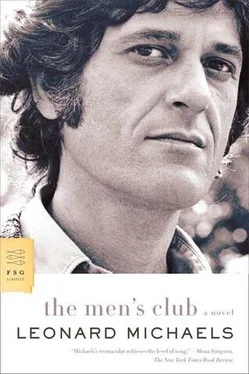Leonard Michaels
The Men's Club
Women wanted to talk about anger, identity, politics, etc. I saw posters in Berkeley urging them to join groups. I saw their leaders on TV. Strong, articulate faces. So when Cavanaugh phoned and invited me to join a men’s club, I laughed. Slowly, not laughing, he repeated himself. He was six foot nine. The size and weight entered his voice. He and some friends wanted a club. “A regular social possibility outside of our jobs and marriages. Nothing to do with women’s groups.” One man was a tax accountant, another was a lawyer. There was also a college teacher like me and two psychotherapists. Solid types. I supposed there could be virtues in a men’s club, a regular social possibility. I should have said yes immediately, but something in me resisted. The prospect of leaving my house after dinner to go to a meeting. Blood is heavy then. Brain is slow. Besides, wasn’t this club idea corny? Like trying to recapture high-school days. Locker-room fun. Wet naked boys snapping towels at each other’s genitals. It didn’t feel exactly right. To be wretchedly truthful, any social possibility unrelated to wife, kids, house, and work felt like a form of adultery. Not criminal. Not legitimate.
“Cavanaugh, I don’t even go to the movies anymore.”
“I’m talking about a men’s club. Good company. You talk about women’s groups. Movies. Can’t you hear me?”
“When the phone rings, it’s like an attack on my life. I get confused. Say it again.”
“Listen to me, man. You’re one of my best friends. You live less than a mile away, but do we see each other three times a year? When is the last time we talked to each other, really talked?”
“I lose over a month a year just working to pay property taxes. Friendship is a luxury. Unless you’re so poor it makes no difference how you spend your time.”
“A men’s club. Good company.”
“I hear you.”
But I was thinking about good company. Some of my married colleagues had love affairs, usually with students. You could call it a regular social possibility. It included emotional chaos. Gonorrhea. Even guilt. They would have been better off in a men’s club.
“What do you say? Can we expect you?”
“I’ll go to the first meeting. I can’t promise more. I’m very busy.”
“Yeah, yeah,” said Cavanaugh and gave me an address in the Berkeley flats. A man named Harry Kramer lived there. I was to look for a redwood fence and pine trees.
The night of the meeting I told my wife I’d be home early. Before midnight, certainly. I had to teach the next day. She said, “Take out the garbage.” Big sticky bag felt unpropitious and my hands soon smelled of tuna fish. After driving only five minutes, I found the place.
The front of the house, vine-covered, seemed to brood in lunatic privacy. Nobody answered when I knocked, but I heard voices, took hold of a wroughtiron handle and pushed, discovering a large Berkeley living room and five men inside. I saw dark wood paneling and potted ferns dangling from exposed beams. Other plants along the window ledges. A potted tree in a far corner, skinny, spinsterish-looking. Nervous yellow leaves filled its head. Various ceramics, bowls on tabletops and plates on the walls beside large acrylic paintings, abstractions like glistening viscera splashed off a butcher block. Also an amazing rug, but I couldn’t take it in. A man was rising from a pillow, coming toward me, smiling.
“I knocked,” I said.
“Come in, man. I’m Harry Kramer.”
“I’m Cavanaugh’s friend.”
“Who isn’t?”
“Really,” I said, giving it the L.A. inflection to suggest sympathetic understanding, not wonder. Kramer registered the nuance and glanced at me as at a potential brother.
His heavy black hair was controlled by a style, parted in the middle and shaped to cup his ears in a way that once belonged to little girls. It was contradicted by black force in his eyes, handshake like a bite, and tattooed forearms. Blue, winged snake. Blue dagger amid roses. They spoke for an earlier life, I supposed, but Kramer wore his sleeves rolled to the elbow. It was hard to connect him with his rug, which I began to appreciate as spongy and orange. I felt myself wading and bouncing through it as Kramer led me toward the men.
Shaking hands, nodding hello, saying my name, each man was a complex flash — eyes, hand, name — but one had definition. He was graphic; instantly closer to me than the others. Solly Berliner. Tall, skinny, wearing a suit. Dead-white hair and big greenish light in his eyes. The face of an infant surprised by senility. His suit was gray polyester, conservative and sleazy. Kramer left me with Berliner beside the potted tree, a beer in my hand. A man about five foot six or seven came right up to us. “Care for a taste?” In his palm lay two brown marijuanas, slick with spittle. I declined. Berliner said, “Thanks, thanks,” with frightening gratitude, and took both cigarettes. We laughed. Then he dropped one back into the man’s palm. Turning toward the others, the man said, “Anyone care for a taste?”
The sound of Berliner’s voice lingered after the joke; loud, impulsive. Maybe he felt uneasy. Out of his natural environment. I couldn’t guess where that might be. He was a confusion of clues. The suit wasn’t Berkeley. The eyes were worlds of feeling. His speedy voice flew from nerves. Maybe the living room affected him. A men’s club would have seemed more authentic, more properly convened, elsewhere. What did I have in mind? A cold ditch? I supposed Kramer’s wife, exiled for the evening, had cultivated the plants and picked the orange rug and the luscious fabrics on the couches and chairs. Ideas of happiness. Berliner and I remained standing, as if the fabrics — heavy velvets, beige tones — were nothing to violate with our behinds. It was a woman’s living room, but so what? The point of the club was to be with men, not to worry about women. I turned to Berliner and asked what he did for a living.
“Real estate,” he said, grinning ferociously, as if. extreme types were into that. Wild fellows. “I drove in from San Jose.” He spoke with rapid little shrugs, as if readjusting his vertebrae. His eyes, after two drags on the cigarette, were full of green distance. He was already driving back to San Jose, I figured. Then he said, “Forgive me for saying this, but a minute ago, when Kramer introduced us, I had a weird thought.”
“You did?”
His eyes returned to me with a look I’d seen before. It signaled the California plunge into truth.
“I hope this doesn’t bother you. I thought …”
I waited.
“Oh, forget it, man.”
“No, please go on. What did you think?”
“I thought you had a withered leg.”
“You did?”
“Yeah, but I see you don’t. Isn’t that weird?”
“Weird that I don’t have a withered leg?”
“Yeah, I thought your leg was all screwed up. Like withered.”
I wiggled my legs. For my sake, not his. He stared as if into unusual depths and seemed, regardless of my wiggling, not convinced. Then he said, “I’m forty-seven.”
“You look much younger.” This was true. But, with the white hair, he also looked older.
“I stay in shape,” he answered, marijuana smoke leaking from his nostrils. “Nobody,” he said, sucking the leak back against crackling sheets of snot, “nobody else in the room is forty-seven. I’m oldest. I asked the guys.”
He gagged, then released smoke, knifing it through compressed lips. “Kramer is thirty-eight.”
I wondered if conversation had ever been more like medical experience, so rich in gas and mucus. “I’m always the oldest. Ever since I was a kid I was the oldest.” He giggled and intensified his stare, waiting for me to confess something, too. I giggled back at him in a social way. Then the door opened and Cavanaugh walked in.
Читать дальше












